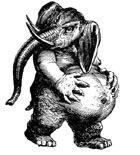
Gluttony
HARVARD DIARY
These days in the privileged precincts of America, gluttony is an all too evident aspect of our existence — the overweight ones as victims, the determinedly thin ones as prideful winners in a constant war against temptation. I doubt Adam Smith and other early apologists for capitalism ever imagined how central to its survival a hyped-up consumerism would one day become — the endlessly clever and manipulative messages that tell us to want more and more, hence by implication to live, always, on the very edge of dissatisfaction. Every day, in countless shopping malls across the land, millions of us assemble in an almost desperate effort to acquire things, as if our very worth as human beings is at stake. Young people in droves use those same malls as hang-outs, places to pass the time of day, places where they can gawk and themselves be regarded, and trysting places too — in movies and restaurants and in the nearby armies of cars, themselves a memorial to a progression of sorts: from a helpful convenience to an economic and social necessity, not to mention a psychological instrument that lends itself to all sorts of symbolic expressions, all sorts of idiosyncratic needs, aspirations.
For many years I never did understand why such a desire to get, to have, to buy and buy, to eat up, to wear then set aside in favor of tomorrow’s garb, to drive this car — why all that hungry inclination to possess, to own (and show to others) amounts to a serious sin. Gluttony and greed struck me as serious, present-day vices, but not especially evil in a spiritual sense. But during my Catholic Worker days (when I had the opportunity to help out at a “hospitality house,” and talk at some considerable length with Dorothy Day), I began to learn otherwise — learn from her, and others close to her, not the virtues of asceticism (a misconception in the minds of some: that she and Peter Maurin were committed ideologically to a kind of Catholic Puritanism), but the distinct danger of a materialism that gets out of hand, becomes outright gluttony, hence sin. Here is Dorothy Day to help us, me, in 1968, to understand the progression I have just mentioned — a response, on her part, to my inquiry as to her attitude toward possessions: “I’m not the one to judge others — I have enough to do trying to keep myself in line [with respect to moral matters]. But I know — from personal experience, that’s how I know — that anything, just about anything can turn into a trap for us: we want it, we get it, we want more, and more, and more — and we’re not [thereby] only greedy, we’re ‘sinful.'”
You May Also Enjoy
Why don’t the “underclass” want to leave it? Is there, perhaps, some failure not of psychology or school experience but of the moral imagination?
As I write this column, America’s magazines and newspapers are offering a fairly extended discussion…
My student was a stand-in for millions of us who have been hearing in schools and reading in newspapers that "values vary, depending on the person."

